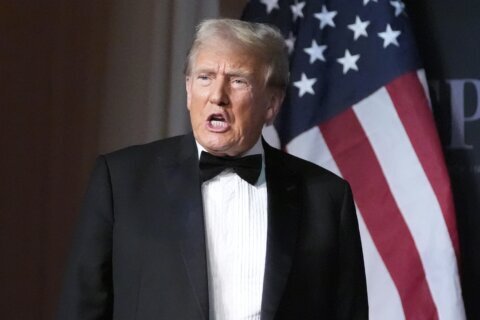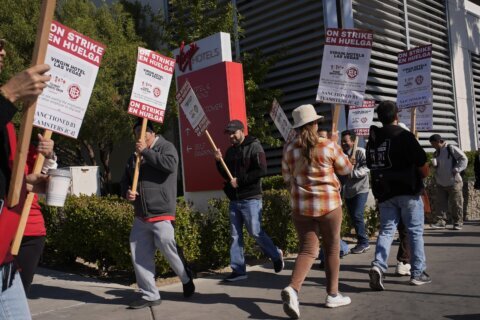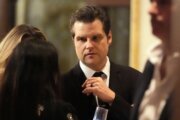LOS ANGELES (AP) — A Los Angeles jury on Wednesday convicted actor Danny Masterson of two counts of rape in a retrial that focused on allegations the “That ‘70s Show’ star raped three women between 2001 and 2003. The verdict sided with two of Masterson’s accusers, but the panel was unable to reach a verdict on similar allegations by a longtime girlfriend of Masterson.
The actor, who was led from court in handcuffs after being a free man throughout the proceedings, faces 30 years to life in prison when he is sentenced. The second trial made the Church of Scientology, which Masterson is a member of, a prominent element.
Here are some of the key elements that emerged during the three-week retrial and what’s next for the actor.
WHAT’S NEXT FOR MASTERSON
The actor will remain in custody while he awaits sentencing, which hasn’t been scheduled yet.
The women Masterson is convicted of raping could give victim impact statements during the sentencing hearing, and the judge is likely to hear from Masterson supporters.
Masterson’s lawyers didn’t address the verdict immediately after it happened, but they’re likely to appeal.
DIRECT DISCUSSION OF DRUGGING
A judge in the second trial allowed the prosecution to say directly that Masterson drugged all three women before raping them, in what may be the biggest difference from the first trial. Previously, the drugging could only be implied when the women testified to feeling disoriented, losing memory and going unconscious to a degree that could not be explained by the alcohol they had consumed.
“The defendant drugs his victims to gain control. He does this to take away his victims’ ability to consent,” Deputy District Attorney Ariel Anson told jurors during her closing argument May 16.
The defense says there is no such evidence beyond the women’s stories, and suggested the prosecution was using the stories because of the absence of evidence of any force or violence. Defense attorney Philip Cohen made clear to jurors that ”there is no drugging charge.”
A BIGGER ROLE FOR SCIENTOLOGY
The Church of Scientology loomed large at Masterson’s trial. It played a bigger role in his retrial, with Judge Charlaine Olmedo allowing expert testimony on Scientology that she denied the first time.
Masterson is a prominent member of the church. All three of his accusers are former members who grew disillusioned with the institution in the aftermath of their alleged assaults, saying that church officials told them what had happened to them was not rape, and that its policies prevented them from going to police. The church vehemently denied having any such policy.
The prosecution’s expert, Claire Headley, is a former official in Scientology leadership who became a staunch church foe, suing it in 2009 over her experience. The defense had on its witness list Hugh Martin Whitt, a current high-level Scientologist who is Headley’s estranged stepfather, though did not call him or any other witnesses before resting.
THE DEFENDANT
Masterson, 47, an actor since childhood, got his major break when he was cast as Stephen Hyde on the retro sitcom “That ’70s Show,” which also starred Ashton Kutcher, Mila Kunis and Topher Grace and would run on Fox from 1998 until 2006. At the time of the alleged assaults, his career was at its peak, and his house near Hollywood with a backyard pool and Jacuzzi was a social hub. It was also, according to prosecutors, the scene of all three crimes. Masterson had pleaded not guilty and his lawyers have repeatedly denied all of the allegations.
THE FIRST ACCUSER
One of the women Masterson is convicted of raping was born into a Scientology family and was part of Masterson’s circle of friends. Nearly all of those closest to her were members, including the late Lisa Marie Presley, who also left the church long before her death in January.
The woman said that when she stopped by Masterson’s house to pick up a set of keys in 2003, he gave her a drink that left her sick and badly disoriented, and raped her in his bedroom upstairs. She first filed a police report, which did not lead to an arrest, in 2004. She returned to authorities in 2016.
Jurors found her account credible and convicted Masterson based on her allegations.
The Associated Press does not typically name people who say they were victims of sexual abuse.
THE SECOND ACCUSER
A model and actor who was Masterson’s girlfriend from 1996 to 2002 took the stand to open the trial. She previously testified that Masterson grew increasingly physically and sexually abusive in their years together. She said that it eventually led to him raping her twice late in 2001, though he is only charged with one instance, a morning when she woke to find Masterson raping her. She would go to police 15 years later.
Jurors could not agree on a verdict on her allegations, deadlocking 8-4 in favor of conviction.
THE THIRD ACCUSER
The third woman at the center of the trial had only recently met Masterson through mutual friends in the church, which she had joined as a teenager. She testified that in 2003 that Masterson invited her to his house, where they were alone. She said she was clear that she wanted no sex, but he convinced her to get into his jacuzzi then took her to his bed, where he raped her. She went to police in 2017.
Jurors convicted Masterson based on her testimony.
INVESTIGATION AND ARREST
Police revealed they were investigating Masterson in March of 2017. Hollywood’s #MeToo firestorm would begin about six months later, and in the midst of it Masterson would be written off “The Ranch,” a Netflix Western comedy where he had reunited with Kutcher.
He was arrested and charged with three rapes in 2020, and in 2021 a judge ruled the evidence was strong enough for him to be tried.
THE FIRST TRIAL
Masterson’s monthlong first trial began last October. Masterson, free on bail, was accompanied to court by a large group of friends and family with ties to both Scientology and the entertainment industry, including his wife and the mother of his child, actor and model Bijou Phillips.
In the end, fewer than half of jurors voted to convict on any of the counts. Nevertheless, the Los Angeles County District Attorney’s Office decided to try again with a new set of jurors, and the women agreed to take the stand again.
Copyright © 2024 The Associated Press. All rights reserved. This material may not be published, broadcast, written or redistributed.







